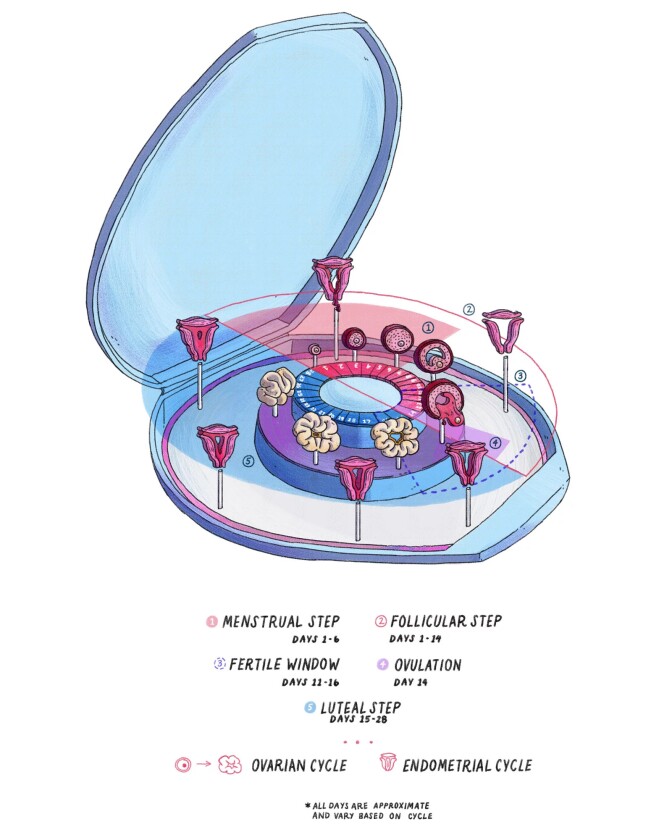Only 18 U.S. states require medically accurate sex education in schools, and even fewer require that menstrual education be part of that. Meanwhile, 22 states still have a tax on tampons and other period products.
This week on LAist’s public affairs show AirTalk, as part of our series on women's health, we’re exploring some crucial topics related to women’s health, like the physiological and legal aspects of menstruation.
Periods: Far from one-size-fits-all
The cycle is a complex, whole-body process that involves communication from the brain to the ovaries via the pituitary gland, says Harvard's Dr. Shruthi Mahalingaiah, a professor of reproductive and women's health.
The ovaries release hormones like estrogen and progesterone to prepare the uterine lining for conception. When an egg is not fertilized, the lining breaks down and is released as blood and tissue through the vagina.
Dr. Mahalingaiah says hormones act as a feedback mechanism from the ovaries to help the pituitary gland regulate aspects like ovulation (the release of an egg from the ovaries) and menstrual cycle length (the time from the first day of one cycle to the first day of the next).
While 28 days is supposedly the normal cycle length, Dr. Mahalingaiah says many women don’t fit that exactly. Twenty-one to 35 days is normal, she says, and even 38 days can be normal. Cycle length can vary throughout a woman’s life, and it can also be also highly responsive to environmental factors, from both inside and outside the body.
Perceived and actual stress, circadian rhythms, and changes in nutrition and exercise can all impact a cycle, she says. Acute stress around upcoming exams or competitions or extreme athletic events can even cause someone to miss a period altogether.
Disruptions to the cycle
Mahalingaiah says that disorders in ovulation can fit into three broad buckets. One is related to environmental factors, such as stress or malnutrition. Another category, and the one she sees most frequently, is disorders of detectable hormones, like disturbances to thyroid function or an excess of prolactin. The third is polycystic ovary syndrome (PCOS), which she says is typically a diagnosis of exclusion, made after ruling out other abnormalities.
Mahalingaiah says that any evaluation for these disturbances should be a full-body approach that involves understanding an individual’s complete medical history and obtaining a lab panel. Hormonal therapy via birth control could be a solution if patients receive enough counseling on how it can affect the body and how to manage the effects — for example, many forms of birth control allow users to skip their monthly bleeding, but Mahalingaiah says it’s important for them to know that going three months without bleeding could cause a potentially risky buildup of uterine lining.
Mahalingaiah says another current area of research is how chemicals in our food, air and personal products can disrupt the menstrual cycle, as these can contain chemicals that disrupt the endocrine system.
“These kind of molecules can mimic hormones,” Mahalingaiah says. “And we're still learning about how chronic exposure can influence cycle lengths long term.”
Menstruation education and policy
Legal protections of those who are menstruating has often been a contested topic, according to Margaret Johnson, a professor of law at the University of Baltimore. For example, when workers have been fired for coming into work late due to menstrual pain, the law is divided on whether that constitutes sex discrimination, since menstruation itself isn’t considered a disability like PCOS or endometriosis.
A British study found that 20% of girls report being bullied about their periods, Johnson said, while 67% say this is happening at school and causing them to miss class. Because many students report lacking access to period products, there has been a recent push to bring them to schools, Johnson says. Sixteen states and the District of Columbia have laws that require free products in schools, but not all of these laws have provisions for actually funding these products.
“So we have a long way to go in making sure that we have period products as easily accessible and free as toilet paper and soap in the bathroom,” Johnson says. “And we need to stop stigmatizing periods. They're not gross. It's just normal. And we need to make sure our schools or workplaces understand that, and are modified to deal with menstruation at work and school.”
Free products could decrease the burden of the “tampon tax” that 22 states still have.
“Condoms aren't taxed in some states, or pixie sticks aren't taxed in some states, cowboy boots aren't taxed in some states,” Johnson says. “But period products are. And and we need to move away from seeing them as something like a luxury item, but instead see them as a necessity.”
Another obstacle to destigmatizing periods is the lack of comprehensive menstrual education in schools. With so few states requiring it, students might be left in the dark about their own bodies — and Johnson says that boys who never receive menstrual education often grow up with controlling attitudes towards women’s periods and how they manage them.
That’s part of why Johnson recommends starting to talk about periods early, around age eight or 10, when many children are curious about puberty, in language that children that age can understand.
“When menstrual education is provided, it's usually in a sex-segregated classroom, where only girls are getting that education,” Johnson says. “And that's a problem because boys can menstruate too if they're transgender, and gender non-binary people can menstruate. So we need to educate all students because everyone might be a potential menstruator.”








